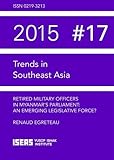Retired Military Officers in Myanmar’s Parliament : An Emerging Legislative Force? / Renaud Egreteau.
Material type: TextPublisher: Singapore : ISEAS Publishing, [2015]Copyright date: 2015Description: 1 online resource (49 p.)Content type:
TextPublisher: Singapore : ISEAS Publishing, [2015]Copyright date: 2015Description: 1 online resource (49 p.)Content type: - 9789814695374
- 9789814695381
- 328.334709591 23
- DS530.65 .E47 2015
- online - DeGruyter
| Item type | Current library | Call number | URL | Status | Notes | Barcode | |
|---|---|---|---|---|---|---|---|
 eBook
eBook
|
Biblioteca "Angelicum" Pont. Univ. S.Tommaso d'Aquino Nuvola online | online - DeGruyter (Browse shelf(Opens below)) | Online access | Not for loan (Accesso limitato) | Accesso per gli utenti autorizzati / Access for authorized users | (dgr)9789814695381 |
Frontmatter -- FOREWORD -- EXECUTIVE SUMMARY -- INTRODUCTION -- THE RETIRED MILITARY OFFICER AS LEGISLATOR (2010–15): A SAMPLE -- LOCATING POWER IN THE UNION LEGISLATURE -- TOWARDS A TYPOLOGY OF THEIR LEGISLATIVE BEHAVIOUR -- INTERACTIONS WITH THE TATMADAW’S PARLIAMENTARY BLOC -- AN EMERGING LEGISLATIVE ELITE? -- CONCLUSION -- REFERENCES -- Appendices
restricted access online access with authorization star
http://purl.org/coar/access_right/c_16ec
Retired military officers continue to wield considerable influence in Myanmar's post-junta politics. As former soldiers, they have developed a particular mindset and a specific view of society as well as of the place and policy role of the armed forces (or Tatmadaw). The first post-SPDC legislature (2010-15) has, however, not been entirely dominated by Tatmadaw retirees, as often perceived. These form only a minority in the Union parliament (or Pyidaungsu Hluttaw). The lower house (or Pyithu Hluttaw) gathers more prominent retired officers than the upper house (or Amyotha Hluttaw). Retired Tatmadaw officers have however been able to capture disproportionate control over most positions of legislative authority in the house, such as the speakerships, as well as several chairmanships and secretariats of key parliamentary committees as well as ad hoc legislative commissions. This remains a key indication of where power lies in the upper levels of the current Union legislature.Drawing on a series of recent interviews, as well as an initial analysis of individual legislative activities performed by Union-level legislators, this paper identifies three types of Burmese parliamentarians with military background: reluctant members of parliament (MPs), dutiful MPs and high-flying MPs. The differences between these are broadly based on the level of their respective public engagement, the effort displayed in performing their legislative activities while in assembly and outside, their perceived political influence within the house, and their immediate and long-term political goals.
Mode of access: Internet via World Wide Web.
In English.
Description based on online resource; title from PDF title page (publisher's Web site, viewed 19. Oct 2024)


